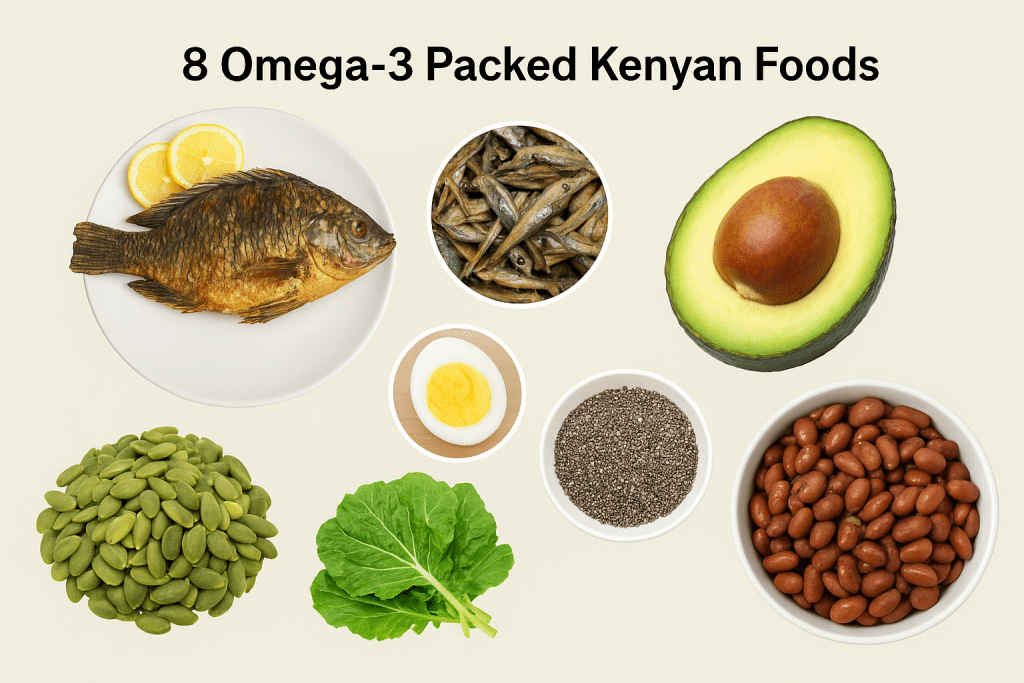1. Omena
If you grew up eating omena, you’ve been getting Omega-3s without even realizing it. These tiny fish from Lake Victoria are packed with the kind of healthy fats that support your heart and brain. Because you eat them whole, omena also gives you calcium and protein — great for strong bones and muscles. Serve it with sukuma wiki and ugali for a meal that’s both familiar and full of goodness.
2. Tilapia
Tilapia is a Kenyan classic, tasty, versatile, and easy to find in most markets. It’s a lean source of protein with natural oils that help balance cholesterol levels. Whether you grill it, stew it, or fry it, tilapia fits perfectly into a heart-healthy diet. Add a squeeze of lemon and a bit of garlic to make it even better.

3. Nile Perch (Mbuta)
Another lake favorite, Nile perch is rich in beneficial fats that help reduce inflammation and support brain health. It’s a bit larger and more expensive than tilapia, but even a small portion offers plenty of nutrition. Mbuta makes for a satisfying meal, especially when paired with greens or a side of ugali.
4. Avocado
Kenya’s avocados are loved across the world, and for good reason. They’re full of healthy fats that help your body absorb Omega-3s from other foods. A few slices of avocado with your breakfast or salad can improve heart health, keep your skin glowing, and leave you feeling full longer. It’s simple, delicious, and homegrown.

5. Pumpkin Seeds (Mbegu za Maboga)
Next time you cook pumpkin, don’t throw away the seeds. Once dried and roasted, they become a crunchy snack packed with plant-based Omega-3s and minerals like zinc and magnesium. They’re great on their own or blended into a smoothie. Small but mighty, these seeds do wonders for brain and joint health.
6. Chia and Flax Seeds
Chia and flax seeds are becoming more common in Kenyan supermarkets, and they’re worth adding to your pantry. These tiny seeds are loaded with healthy fats and fiber that help manage cholesterol and improve digestion. Stir a spoonful into your uji, yogurt, or juice. They are tasteless but full of benefits, especially if you don’t eat fish.
7. Free-Range (Kienyeji) Eggs
Local kienyeji eggs have more Omega-3s than factory-farmed ones, thanks to the chickens’ natural diet of greens and insects. They’re a great source of protein and nutrients, perfect for breakfast or a light lunch.
8. Traditional Green Vegetables
Some traditional greens like managu, terere, and kunde contain small amounts of healthy fats too. When cooked with a bit of oil, their nutrients are better absorbed by your body. Combine them with omena or avocado for a balanced, nutrient-packed meal that’s both local and affordable.
Why You Need Omega-3
Lifestyle diseases such as heart disease, diabetes, and high blood pressure are becoming more common in Kenya. Eating foods rich in healthy fats can help prevent these conditions by lowering bad cholesterol, improving blood flow, and boosting mental health. For children and young people, Omega-3s also support brain development and learning.
Benefits of Omega-3s
- Keeps your heart healthy
- Balances cholesterol and blood pressure
- Reduces inflammation
- Boosts brain function and memory
- Improves focus and learning
- Supports clear vision and healthy eyes
- Keeps skin and hair strong
- Helps during pregnancy and baby growth
- Strengthens the immune system
- Lifts mood and reduces stress
- Supports joint and bone health
- Helps control weight and blood sugar
- Improves overall energy and metabolism
By Ruth Gachau




